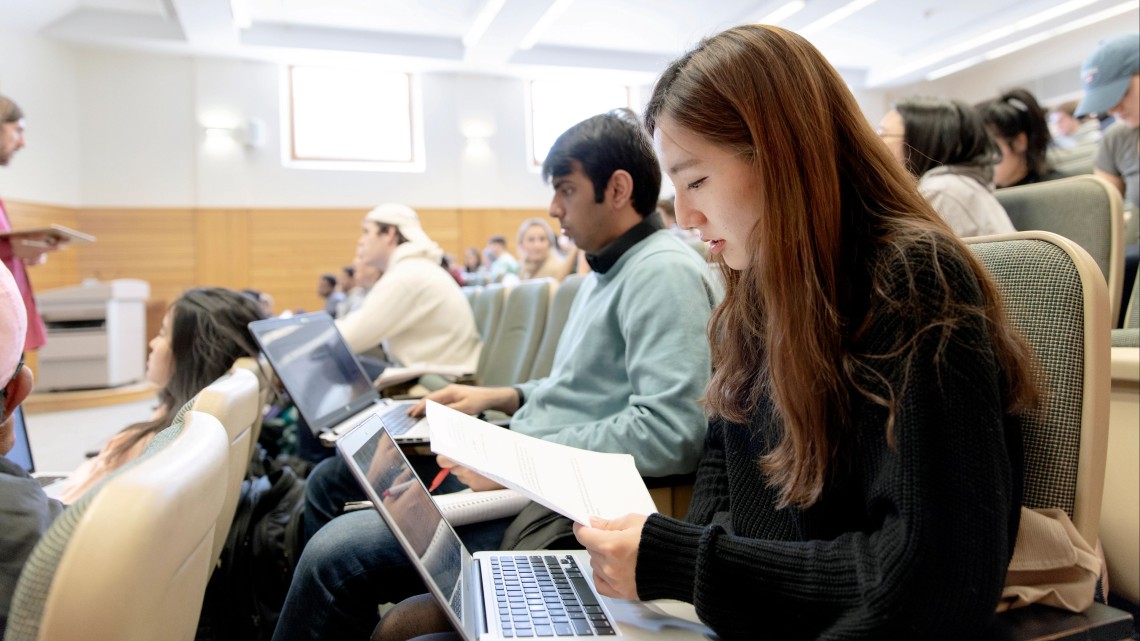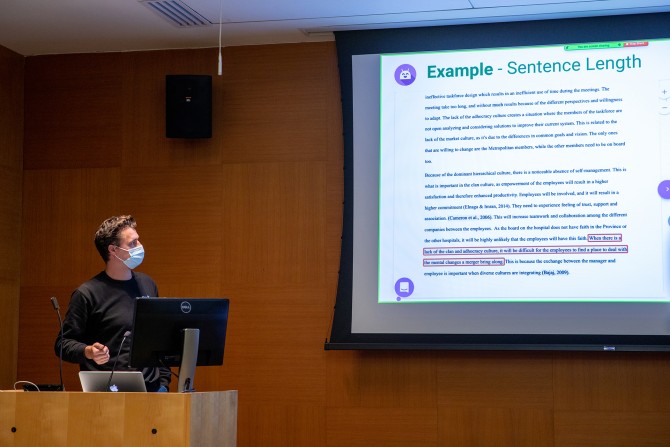
Students use learning technologies in the classroom and online. Learning technologies can help build connection and prevent a sense of isolation in online classes.
News directly from Cornell's colleges and centers
Social annotation and peer review technologies boost online collaboration
By Dave Winterstein
Building community and creating connections among students are challenges that faculty face in the classroom. Online education, especially during the pandemic, has required faculty to think about new ways to build collaboration. Addressing these needs can significantly improve achievement of learning outcomes too.
Robert Vanderlan, senior associate director at the Center for Teaching Innovation (CTI), and Rachel Gunderson, a CTI instructional designer, presented learning technologies at Cornell that can help instructors build such connections in their keynote speech to the Technology-enhanced collaborative learning section of the Global MOOC and online education conference. At the conference, on December 6, 2021, an audience of over 90,000 learned about two successful learning technologies at Cornell: FeedbackFruits, a peer review tool, and Hypothesis, a social annotation tool.
Vanderlan said, “Faculty learned significant information about online learning from the pandemic,” said Vanderlan. “Perhaps predictably, they learned that Zoom lectures can be boring, and more importantly, that students need a sense of connection.” He went on to say that a sense of connection is critical because online education can be isolating for students.
As a result of this finding, collaborative learning has taken on new relevance.
“This is not about overthrowing existing practices,” said Vanderlan. “Rather, it highlights the importance of humanizing the learning experience and recognizing students as whole individuals, both online and in person.”
Peer review and social annotation are two ways to connect with students while furthering learning. Gunderson said peer review is a structured learning process for students to critique and provide feedback to each other on their work. Vanderlan called social annotation, “the digital equivalent of taking margin notes.” He noted the added benefit of being able to respond to classmates’ comments if groups work together on the same text.
Vanderlan and Gunderson described the two tools supported at Cornell, FeedbackFruits for peer review, and Hypothesis for social annotation, and ways faculty can add these strategies to their teaching.
In selecting these tools for licensing at Cornell, ease of use was more important than functional richness. Vanderlan said that both students and faculty need to be able to use the learning technologies to interact with course material and each other rather than fumbling with the tools themselves.
Gunderson said that, in early use of FeedbackFruits at Cornell, 92% of faculty found it easier to facilitate peer review assignments, which can be cumbersome to administer, especially in large classes. She said, “Peer review assignments helped students think critically about their work, improved the final project submitted, and gave them practice giving constructive feedback.”
Vanderlan noted similar findings from faculty use of Hypothesis for social annotation assignments at Cornell. He said, “Faculty reported deeper discussions when using Hypothesis than before.” Feedback from pilot usage also showed that students felt social annotation with Hypothesis helped them learn to think critically, read actively, and prepare for class discussion.
The Global MOOC and Online Education Conference was sponsored by the Global MOOC and Online Education Alliance and the United Nations Educational, Scientific, and Cultural Organization (UNESCO) Institute for Information Technologies in Education (IITE). The University of Macau’s Center for Teaching and Learning Enhancement co-chaired the Technology-enhanced collaborative and blended learning sub-forum at the conference.
Contact the CTI for more information about peer review, social annotation, or learning technologies available at Cornell.
Dave Winterstein is a communication specialist at the Center for Teaching Innovation.
Media Contact
Get Cornell news delivered right to your inbox.
Subscribe

